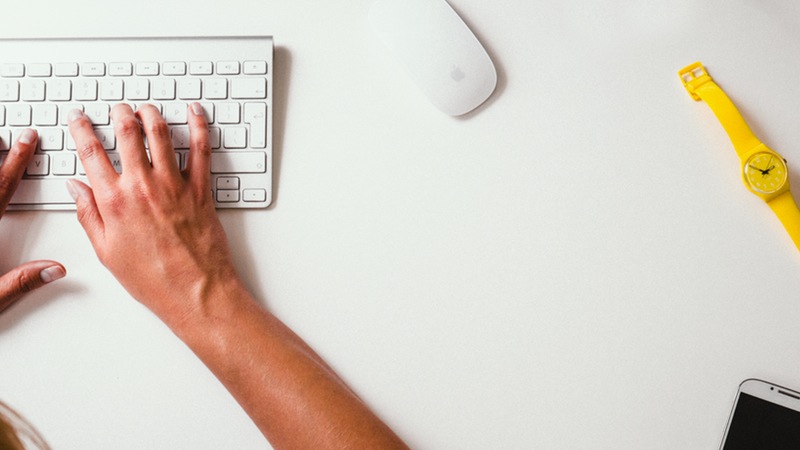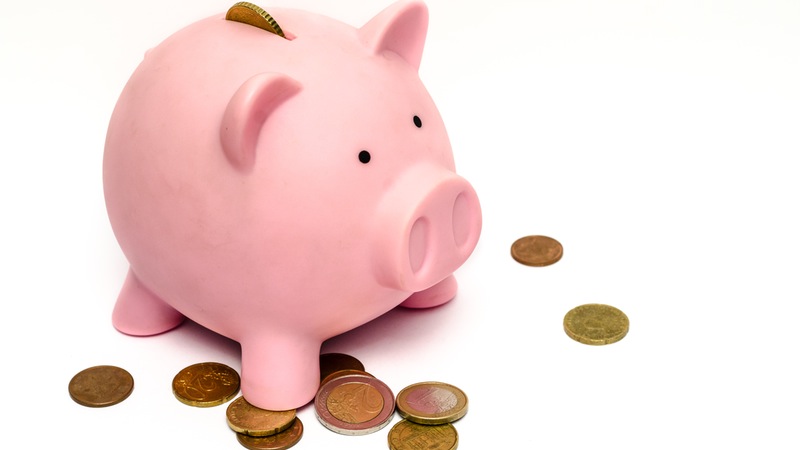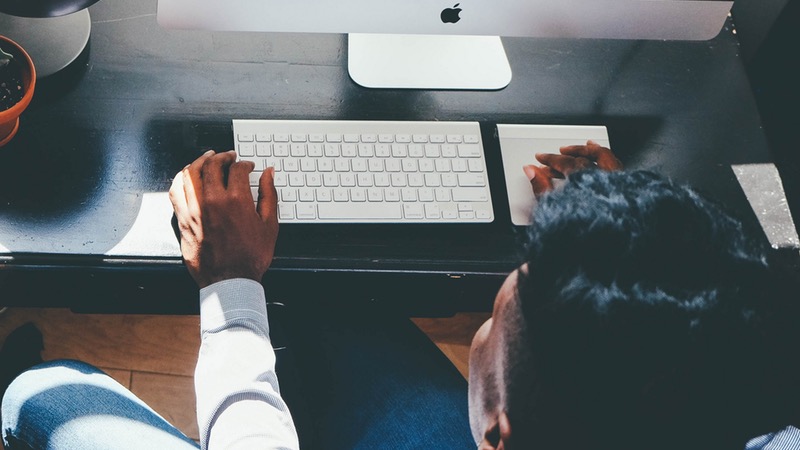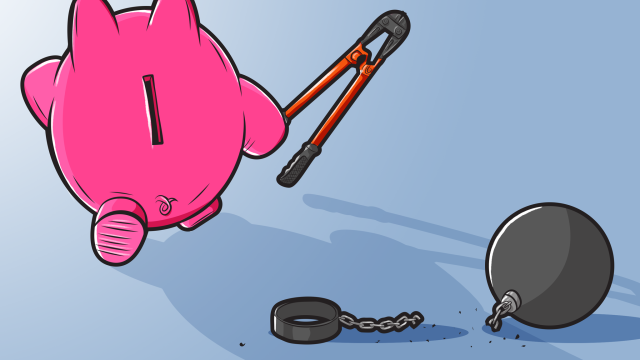In my 20s, I paid off my student debt and it felt amazing. For the first time ever, I had discretionary income: Money left over after necessities. Aside from buying a bunch of crap I didn’t need, I had no idea what to do with that money. If this sounds familiar, whether you’ve just paid off a car loan, student loan or a credit card, here are some steps to take.
Illustration by Sam Woolley. Pictures: www.lifeofpix.com, skitterphoto.com, pixabay.com
Make a Plan to Not Go Into Debt Again

Once you pay off a big debt (or even better, all your debt), the last thing you want to do is ruin your progress by going right back into debt. Many people do, though. To avoid this, take a minute to think about where your debt came from in the first place and how long it took you to get out. It’s easier to get back into certain types of debt than others. For example, you’re probably less likely to rack up student loan debt again than credit card debt.
Many folks assume people go into debt because they have no self-control, but that’s not always the case. Sometimes people go into debt when they’re in desperate situations. Maybe emergencies are your trigger. Every month or so, something comes up: Your car needs an alignment or your dog needs surgery or YOU need surgery. If emergencies keep forcing you to put stuff on credit cards just to get by, focus on building an emergency fund. You don’t have to save the traditional three to six months’ worth of living expenses, either.
You can start small and save just enough to not go back into debt. Yes, you still have the emergency expense in your life, but if you’re prepared for the expense, you’re in a better position financially and you don’t have to make desperate and vulnerable decisions.
And sometimes it’s just regular expenses that creep up on you. The holidays are a good example of this. A lot of people go into debt over the holidays because they’re just unprepared for the expenses. But it’s not like you can’t see these coming. If the holidays are a debt trigger for you, nip it in the bud this year by saving now. Use an online budgeting tool to help you calculate costs, then set aside a percentage every month for holiday spending.
Of course, for some folks, problem spending is actually the problem. Ask yourself some questions about money that may seem silly but can actually reveal some interesting attitudes and habits:
- How did your parents handle money?
- How did you view money growing up?
- What’s your definition of “needs” versus “wants”?
These are some touchy-feely questions, I know, but they can tell you a lot about how you got into debt. For example, my family was broke growing up, so I loved the idea of being able to spend my money on whatever I wanted whenever I wanted. My student debt wasn’t a good example of this, but the money I racked up on credit cards was. I realised that, if left unattended, my impulse spending could get me back in debt. There are practical triggers to think about, too, though. The Daily Worth offers a few examples:
For instance, do you give in to your friends’ pressure to spend on expensive dinners, trips, or shopping sprees, or do you hit the mall whenever you’re bored or feeling down? Identifying these patterns and ways of thinking and then taking steps to change your behaviour will help keep you out of debt, Perez says.
If your trigger is impulsive spending, you can come up with a few rules to avoid temptation and punish yourself for splurging, like:
- Deleting your saved payment info so you’re not tempted to spend
- Not spending on the weekdays to avoid impulsive spending
- Levying a “splurge tax” on yourself when you overspend
But ultimately, it comes down to focusing on not just the trigger or the response, but the space in between. To really avoid getting back into debt, you can’t just focus on what triggers your spending and how you respond once you’ve already spent. You have to focus on resisting the temptation to spend in the first place. To do this, think of impulsive spending as the enemy of your financial goals. (Don’t have any goals? Don’t worry, we’ll get to that.)
Come Up With a New Goal

If you’ve paid off a big debt but you still have others, obviously you should tackle those first. Pick a method like the Snowball (focus on smallest debts), Stack (focus on highest interest rate debts) or the Blizzard (a combination of the two). Chances are, if you’ve paid off a big debt, you’re well on your way to paying off the others. But what happens after that?
I bought so much junk after paying off all my debt. Hundreds of dollars worth of clothes I rarely wore. Phone upgrades I didn’t really need. A vintage ALF lunchbox I found at a garage sale (which was awesome, but not the best use of my money, as it collected dust in the back of my closet for years).
There’s a case to be made for “it’s your money, spend it on what you want”, but that’s the thing: I wasn’t doing that. I had no idea what I wanted. I knew saving money was good, so I saved an obligatory amount in a bland retirement fund, but beyond that, I was clueless. So I started thinking about possibilities and made a list of stuff I wanted to do, regardless of money: Move and take a trip overseas. Now, I had a goal for my discretionary income: Save for a big trip and save for a big move. Suddenly, my finances had a purpose again, and I stopped throwing it away on junk so I could use it for goals that actually mattered to me.
You don’t need some big, cliche travel goal for your money, though. Your goal might just be to start saving for your kid’s education or to provide a more comfortable life for your family. Whatever it is, coming up with a clear goal is the first thing you should do to get your money in order. Once you know your goal, it’s time to recalibrate your budget accordingly.
There are some practical goals you should have, too. If your emergency fund just gets you by, for example, you want to beef it up now. And then there’s saving for retirement. How much you save depends on a handful of different factors, from how long you have until you retire to what kind of lifestyle you want in retirement. Thankfully, there are plenty of online retirement calculators that can help you come up with a monthly amount. Plug in your numbers and make sure you’re saving enough.
Beyond that, let’s say you don’t really have any medium-term goals like travel or saving for a home: You simply want to save more for the future. After saving for an emergency and paying off debt, your next steps are:
- Increase your super contributions
- Start a regular savings or taxable investment account
Of course, your situation might vary. These are just general suggestions for optimising your long-term savings.
Monitor Your Finances Going Forward

If you want to stay out of debt and reach your new financial goals, you’ll need to monitor your money going forward. That means tracking your spending and making sure you stick to a budget.
That much is clear, and it’s probably what helped you get out of debt in the first place. Beyond the obvious, though, it’s critical to keep tabs on your credit once you get out of debt. After all, you’ve proven your creditworthiness by paying back what you owe, so you want to make sure your credit score and report reflect this. There are a few ways you can monitor your credit, such as via Veda. So what do you look for? A few things.
First, you want to make sure the accounts you’ve paid off reflect that you’ve paid them off. Your balances should be at zero, and your status should read something like “current” or “paid as agreed”.
Second, it may take a few months, but your credit score should go up. Payment history makes up a large percentage of your score and, with a positive one, your score should eventually improve. Credit utilisation makes up a big percentage of your score, too. This is the amount of credit you have available versus how much of it you actually use. Once you pay off a debt, if the account is still open (if it’s a credit card, for example), you still have that credit available, you’re just not using it. This means your credit utilisation is lower, and your score should be higher.
Paying off debt is a big deal! You’re more in charge of your finances now, and if you want to stay in charge, you should keep your money goals front of mind. Spend 15 minutes on personal finance every day. Research the next step, whether it’s investing or saving up for a house. The more you can keep money management front of mind, the better you can ensure you’ll stick to a plan and stay out of debt.

Comments